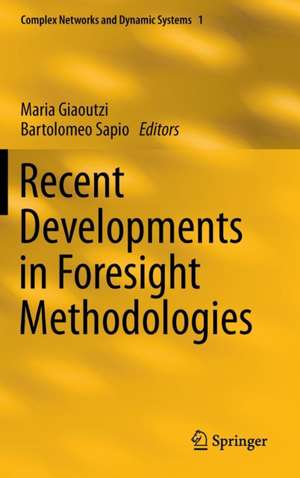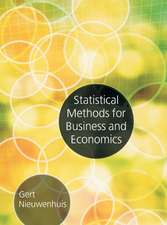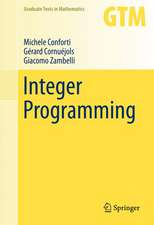Recent Developments in Foresight Methodologies: Complex Networks and Dynamic Systems, cartea 1
Editat de Maria Giaoutzi, Bartolomeo Sapioen Limba Engleză Hardback – 27 noi 2012
The methodological development of foresight is an important task that aims at strengthening the pool of the tools available for application, thereby empowering the actors involved in foresight practice. Elaborating further on methodological issues, such as those presented in the present book, enables the actors involved in foresight to begin to critique current practice from this perspective and, thirdly, to begin to design foresight practice. The present trends towards methodological concerns indicates a move from ‘given’ expert-predicted futures to one in which futures are nurtured through a dialogue among “stakeholders.” The book has four parts, each elaborating on a set of aspects of foresight methodologies. After an introductory section, Part II considers theorizing about foresight methodologies. Part III covers system content issues, and Part IV presents foresight tools and approaches.
| Toate formatele și edițiile | Preț | Express |
|---|---|---|
| Paperback (1) | 940.54 lei 6-8 săpt. | |
| Springer Us – 13 dec 2014 | 940.54 lei 6-8 săpt. | |
| Hardback (1) | 953.35 lei 6-8 săpt. | |
| Springer Us – 27 noi 2012 | 953.35 lei 6-8 săpt. |
Preț: 953.35 lei
Preț vechi: 1162.61 lei
-18% Nou
Puncte Express: 1430
Preț estimativ în valută:
182.42€ • 191.00$ • 151.31£
182.42€ • 191.00$ • 151.31£
Carte tipărită la comandă
Livrare economică 09-23 aprilie
Preluare comenzi: 021 569.72.76
Specificații
ISBN-13: 9781461452140
ISBN-10: 1461452147
Pagini: 328
Ilustrații: XVIII, 310 p.
Dimensiuni: 155 x 235 x 22 mm
Greutate: 0.83 kg
Ediția:2013
Editura: Springer Us
Colecția Springer
Seria Complex Networks and Dynamic Systems
Locul publicării:New York, NY, United States
ISBN-10: 1461452147
Pagini: 328
Ilustrații: XVIII, 310 p.
Dimensiuni: 155 x 235 x 22 mm
Greutate: 0.83 kg
Ediția:2013
Editura: Springer Us
Colecția Springer
Seria Complex Networks and Dynamic Systems
Locul publicării:New York, NY, United States
Public țintă
ResearchCuprins
In Search of Foresight Methodologies: Riddle or Necessity.- Defining the Future: Concepts and Definitions as Linguistic Fundamentals of Foresight.- Classification of Tools and Approaches Applicable in Foresight Studies.- Classification of Tools and Approaches Applicable in Foresight Studies.- Bridging Qualitative and Quantitative Methods in Foresight.- The Meaning of Wild Cards and High Impact Issues as Future Shapers and Shakers. Forms of Reasoning in Pattern Management and in Strategic Intelligence.- Micro-meso-macro: From the Heritage of the Oracle to Foresight.- From Narrative to Number: A role for Quantitative Models in Scenario Analysis.- Foresight at a Contract Research Organization: Linking Stakeholders and Methods in Participatory Processes.- Will Entrepreneurship, Knowledge Management and Foresight Emerge in a System?.- Scenario Transfer Methodology and Technology.- Willingness of Stakeholders to Use Models for Climate Policy: The Delft Process.- Linking Narrative Storylinesand Quantitative Models to Combat Desertification in the Guadalentin, Spain.- Scenario Planning as a Tool in Foresight Exercises: The LIPSOR Approach.- Foresights, Scenarios and Sustainable Development: A Pluriformity Perspective.- Methodological Challenges in Combining Quantitative and Qualitative Foresight Methods for Sustainable Energy Futures - The SEPIA Project.- Building Strategic Policy Scenarios for the EU Agriculture - The AG2020 Project.- Opportunities for Combining Quantitative and Qualitative Approaches in Scenario-Building - The "Estonia 2010" Project.
Textul de pe ultima copertă
Foresight is an area within Futures Studies that focuses on critical thinking concerning long term developments, whether within the public sector or in industry and management, and is something of a sub-section of complexity and network science. This book examines developments in foresight methodologies and relates in its greater part to the work done in the context of the COSTA22 network of the EU on Foresight Methodologies. Foresight is a professional practice that supports significant decisions, and as such it needs to be more assured of its claims to knowledge (methodology). Foresight is practiced across many domains and is not the preserve of specialized ‘futurists’, or indeed of foresight specialists. However, the disciplines of foresight are not well articulated or disseminated across domains, leading to re-inventions and practice that does not make best use of experience in other domains.
The methodological development of foresight is an important task that aims at strengthening the pool of the tools available for application, thereby empowering the actors involved in foresight practice. Elaborating further on methodological issues, such as those presented in the present book, enables the actors involved in foresight to begin to critique current practice from this perspective and, thirdly, to begin to design foresight practice. The present trends towards methodological concerns indicates a move from ‘given’ expert-predicted futures to one in which futures are nurtured through a dialogue among “stakeholders.” The book has four parts, each elaborating on a set of aspects of foresight methodologies. After an introductory section, Part II considers theorizing about foresight methodologies. Part III covers system content issues, and Part IV presents foresight tools and approaches.
The methodological development of foresight is an important task that aims at strengthening the pool of the tools available for application, thereby empowering the actors involved in foresight practice. Elaborating further on methodological issues, such as those presented in the present book, enables the actors involved in foresight to begin to critique current practice from this perspective and, thirdly, to begin to design foresight practice. The present trends towards methodological concerns indicates a move from ‘given’ expert-predicted futures to one in which futures are nurtured through a dialogue among “stakeholders.” The book has four parts, each elaborating on a set of aspects of foresight methodologies. After an introductory section, Part II considers theorizing about foresight methodologies. Part III covers system content issues, and Part IV presents foresight tools and approaches.
Caracteristici
Brings the entire field of Foresight Methodology up to date Provides a major step forward in standardizing Foresight research methods Spans the fields of network science, regional science, management science, and futures studies














